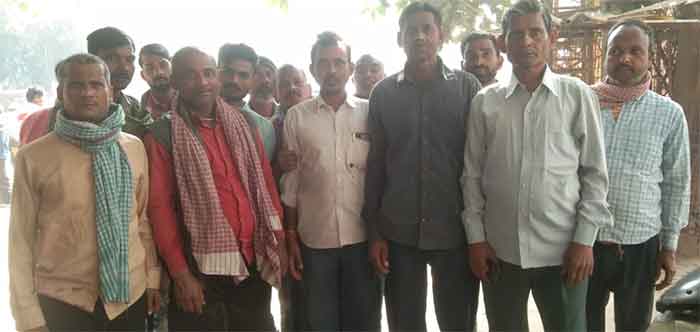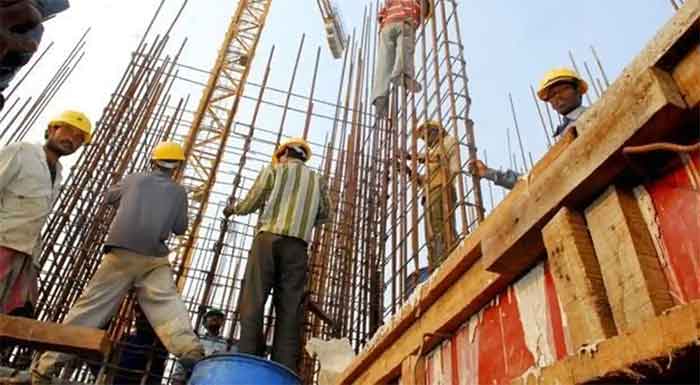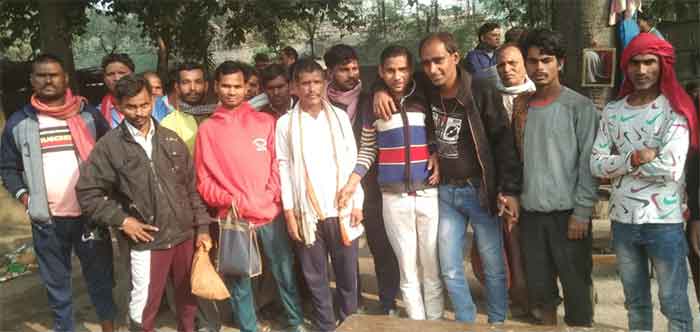
It is around 10 in the morning and the number of workers at the Sigalpur labor chowk in Shalimar Bagh area of Delhi is increasing. As a worker Munna says—“The hope of getting any work is much lesser now due to pollution related ban on construction but still workers assemble here in the hope of getting at least some minor repair or other work.”
This is just one of the numerous labor chowks in Delhi where workers gather every morning to offer themselves for daily wage employment. It is an indication of the desperation of workers that quite a large number, around 50 or so, have gathered at this chowk even when the prospects of work are low.
Workers here explain that even when the situation is normal, on average they get employment only on 15 days in a month, earning only about Rs. 7500 in a month if there is only one earning member in a family. It is just not possible to survive on the basis of this income in Delhi, workers say. So in many cases women also work in construction, domestic work and even industries. Even in a family of two earning members, earnings rarely exceed Rs. 13,000.
The workers here mostly live in rented one small room accommodation with shared toilet in Sigalpur village. About 20 to 30 persons may have to share a single toilet. The small room also serves as the kitchen. For this room they have to pay about Rs. 3000 to Rs. 3500 per month as rent and electricity charges to the owner.
What is shocking is that only 10% of the workers assembled here get subsidized or free grain on ration cards. We do not have Delhi ration cards, say these workers most of whom have migrated from eastern UP or other areas. When I told them that the government has implemented a scheme under which they can get ration on their village ration card here, they said that this has not been implemented in their case at least. Hence all food grain also has to be purchased at the market rate.
Hence all the time there is a struggle to meet basic food needs. One worker said—just ask all the workers here if any of them even had a cup of tea before coming here and you will know how few could even have that. Only 10% of the workers are able to buy any milk at all here for their families. We have almost forgotten about buying any fruits for our family. If someone comes to pick us for work, we will have to ask him to give Rs. 50 advance so that we can eat something at lunch time.
Another worker said—sometimes we may not even have the cooking fuel. On further inquiry the workers said that as hardly anyone can buy a full size gas cylinder, so a smaller 5 kg. cylinder is purchased and a refill of only about 1 or 2 kg. may be done at a time because this may be all that the worker can afford.
Workers here said that quite a few workers have gone back to their villages as it was becoming very difficult to survive here.
At another labor gathering point or chowk in Haiderpur, a worker Indrasen said that the recent festival season including Diwali brought hardly any joy to workers due to the high rate of unemployment and very low earnings. Workers explained by giving estimates of their earnings and essential expenses that it is becoming increasingly difficult for them to meet their basic needs. In fact if there is only one earning member survival is actually very difficult and this survival actually hides a lot of hunger and deprivation. Even in case of households of two earning members, survival is rather precarious. With winter fast approaching most worker households are short of warm clothing.
Victims of accidents said that there must be some compensatory mechanism so that their family can survive till their injury heals and they can work again. A disabled youth Anil said that he has been going from pillar to post but he has not received any relief elsewhere.
Most of the workers here face problems relating to not getting their labor card (or not being able to renew it) and not getting the various benefits meant for construction workers under the two laws enacted for their welfare.
Most of the problems of workers assembled here are similar to those of the workers of Sigalpur. What workers at both these hiring points reflect most is a desperation to somehow find employment in difficult conditions. As a worker said—when someone comes to hire us and sees that so many of us are so desperate to get work, the wage rate starts climbing down. If the employer was first thinking of paying Rs. 500, he now finds workers willing to work for Rs. 400 or even less and takes them. We undercut our own wage, such is the desperate need for employment.
Several workers raise questions that when their work for the most part is not polluting, so why are they denied work for so many days each year.
Last year a few workers got a compensatory payment of Rs. 5000 for the pollution related unemployment period, but this year they have not received this yet.
I did not see any employers coming in to hire workers while I was talking to workers. However workers said they will keep waiting. Then in the afternoon some may walk away to get free lunch at a temple if it is available, then again come here to try their luck for work once more before returning home.
Bharat Dogra is Honorary Convener, Campaign to Save Earth Now. His recent books include Planet in Peril, Man over Machine and A Day in 2071.















































